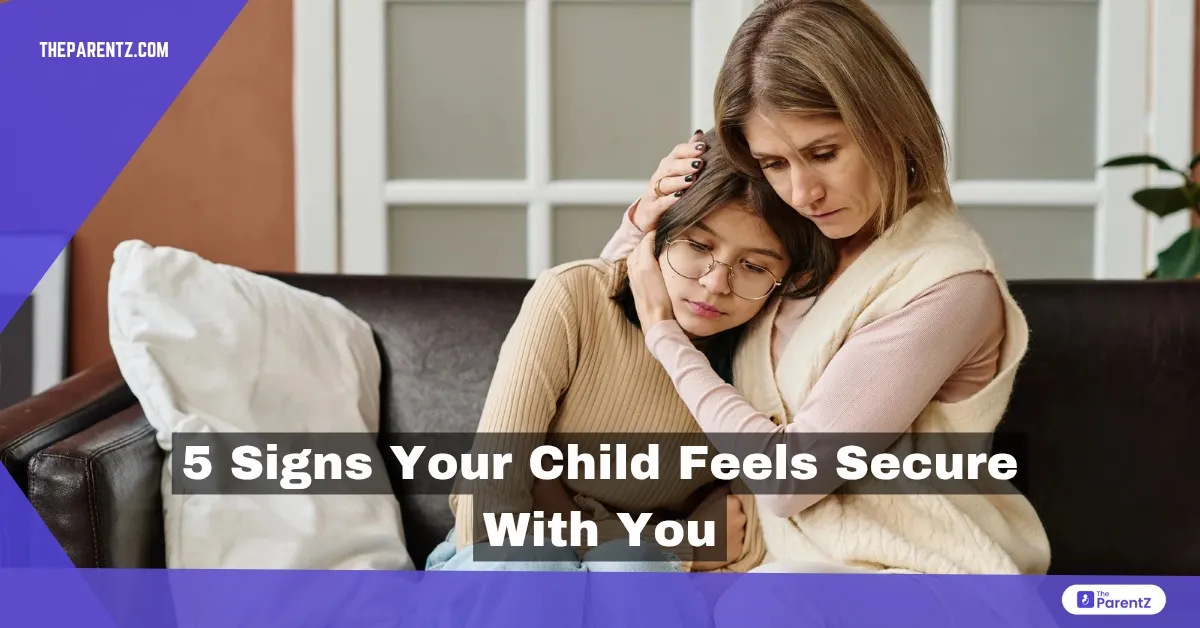As parents, we often wonder if we’re doing enough for our children. Are they happy? Do they feel safe? Do they trust us? Parenting is full of moments where we second-guess ourselves, but there are small, beautiful signs that can reassure us that we’re on the right path. When your child feels secure with you, it’s not something they say outright—it’s something they show through their actions and behaviors.
Let’s talk about five signs that your child feels safe and secure with you. These aren’t just surface-level observations; they’re deeply emotional moments that reflect the bond you’ve built together. And if you don’t see these signs yet, don’t worry—we're here to help you.
They Share Their Thoughts and Feelings With You
Have you ever had your child come to you out of nowhere and say, “Mom, I’m scared about tomorrow’s test,” or “Dad, I felt left out at school today”? These moments might seem small, but they’re huge indicators of trust. When your child feels secure, they open up about what’s going on inside their heart and mind.
From Their Perspective:
Kids don’t always know how to express themselves perfectly. But when they feel safe with you, they know they can try—even if their words come out messy or incomplete. They trust that you’ll listen without judgment or dismissal.
What You Can Do:
If your child isn’t sharing much, start small. Instead of asking big questions like “How was your day?” (which can feel overwhelming), try something specific: “What was the funniest thing that happened today?” or “Did anything make you feel sad today?” Show them that their feelings matter to you—no matter how big or small.
They Turn to You for Comfort
Think about the last time your child got hurt or felt scared—did they run to you? Did they reach for your hand during a thunderstorm or ask for a hug after a tough day? These moments are powerful signs that your presence makes them feel safe.
From Their Perspective:
When kids turn to you for comfort, it’s because they believe you’re their anchor in a chaotic world. They know you’ll make things better—or at least make them feel less alone in their fear or pain.
What You Can Do:
If your child doesn’t naturally come to you during tough moments, try being more present and available when things go wrong. Sit with them quietly when they’re upset instead of rushing to fix the problem. Sometimes, kids just need to know you’re there, even if there’s no immediate solution.
They Value Your Advice
It might surprise you when your child asks for your opinion on something—“Should I wear this shirt or the other one?” or “What do you think I should do about my friend who’s mad at me?” These questions show that your child respects and trusts your judgment.
From Their Perspective:
Kids look up to their parents more than we realize—even when they seem like they’re ignoring us! When they ask for advice, it’s because deep down, they believe in your wisdom and want to learn from it.
What You Can Do:
If your child doesn’t often seek your advice, try offering guidance in a way that feels collaborative rather than controlling. Instead of saying, “You should do this,” try saying, “What do you think would happen if we tried this?” This approach makes them feel like their opinion matters too—and strengthens the bond between you both.
They Run to You First During Big Moments
When something exciting happens—like winning a prize at school—or something scary happens—like hearing a loud noise—does your child look for you first? That instinctive reaction shows how much they rely on you emotionally.
From Their Perspective:
To kids, parents are like home base in a game of tag: the safest place to run when emotions get overwhelming, whether those emotions are joy or fear. They want to share their highs and lows with the person who makes them feel grounded.
What You Can Do:
If your child doesn’t naturally turn to you during big moments, make an effort to celebrate their wins and comfort their fears without distractions (like checking your phone). Show them that no matter what’s happening in the world around them, you’re there.
They Confess When They’ve Made a Mistake
This one might not seem like an obvious sign of security—it can be hard to hear “I broke the vase” or “I spilled juice on the couch.” But when kids admit their mistakes instead of hiding them, it shows they trust you won’t react with anger or harshness. They believe in your fairness and understanding.
From Their Perspective:
Confessing mistakes is scary for kids—they don’t want to disappoint you or get into trouble. But if they feel secure with you, they know that while there might be consequences, there will also be forgiveness and love at the end of it all.
What You Can Do:
If your child struggles to admit mistakes, focus on creating an environment where honesty is valued more than perfection. When something goes wrong, respond calmly: “Thank you for telling me—it means a lot that you were honest.” This helps them see mistakes as learning opportunities rather than disappointments.
Conclusion
Every parent wants these signs from their child—but not every parent sees them right away, and that’s okay! Parenting isn’t about being perfect; it’s about showing up every day with love and patience—even when things get hard.
If these signs aren’t showing up yet in your relationship with your child, take heart: connection takes time and effort but is always worth it in the end. Be present with them in small ways—listen when they talk (even if it’s about cartoons), hug them when they seem distant, and remind them every day that no matter what happens, you’re here.
Your love is the foundation of their security—and even if it takes time for them to show it fully, know that every moment spent building trust will shape their future in ways more meaningful than words can express.








Be the first one to comment on this story.